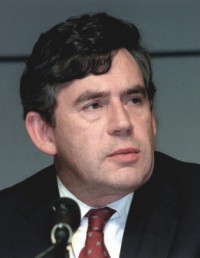|
Musings
The Misfortunes of Good Men
Syed Badrul Ahsan
 |
Tajuddin Ahmed |
YOU do not feel comfortable, even though you may not be into politics, when good, capable men like Gordon Brown fall on bad times. His has been an extraordinary career. As chancellor of the exchequer, he turned the British economy around to a point where it transformed itself into a giant enterprise. And he did that with Tony Blair as prime minister. Sometimes you tend to wonder why it was Blair and not Brown who took charge of Britain in May 1997. Had Brown been prime minister in that year and had he rather than Blair continued in office, politics in Britain would have been a better affair and the world would have been a better place to live in. You cannot imagine Brown genuflecting before the likes of George W. Bush and Dick Cheney. You do not picture anyone humiliating Brown as Washington's poodle.
Brown is in trouble, to a point where he may soon quit as prime minister or lose the next election. You think back on the past, on all the other good men who have had to walk away from power, or could not come close to it, because of sheer bad fortune. Willy Brandt was an iconic politician, West Germany's visionary chancellor in the early 1970s. The first western politician to think in terms of breaking through the Cold War, he visited communist East Germany and made Ostpolitik famous as policy. Yet in 1974, once an East German mole was found to be enjoying a senior position in his office, Brandt invoked morality and quit office. Few, if any, men have matched him in stature since. In France, when Charles de Gaulle made good on his promise to resign should he lose a referendum he had set before the country, no successor coming close to him in terms of renown or ability could be spotted. Georges Pompidou and Valery Giscard d'Estaing were good men, but they were not great men. It was not until Francois Mitterrand came into office that French grandeur, this time at an intellectual level, once more defined French politics.
 |
| Bad times for Brown |
In Bangladesh, had politics taken a turn different from the one it went through in August and November 1975, Tajuddin Ahmed could have transformed the country into a truly egalitarian republic. He was eminently qualified to do so, seeing that it was he more than anyone else who cleared a way out of the thick woods for Bengalis once the Pakistan army went on a murderous spree in East Pakistan. Tajuddin's luck held in 1971, when many in his party sought to eject him from leadership of the liberation war but somehow could not. It ran out in 1974, when those very enemies successfully drove a wedge between him and Bangabandhu Sheikh Mujibur Rahman. The fallout between Mujib and Tajuddin was the most grievous wound inflicted on free Bangladesh and we are yet paying for that parting of the ways. Go back in time. If Gandhi had not so openly taken Sitaramayyah's side in the contest between the latter and Subhash Chandra Bose for the presidency of the Indian National Congress in the late 1930s, the history of the subcontinent would have followed a different course. Had Bose lived, had he not been alienated by Gandhi and Nehru, it is quite possible that India would not go through the vivisection that would mar the lives of its people and their descendants. For that matter, you wonder if the early death of Deshbandhu Chittaranjan Das in 1925 (and he was only fifty one) did not condemn India to perdition of the kind that would come in the wake of partition.
The story of Iran would have been quite different if the CIA had not plotted the fall of Mohammad Mossadegh and the return of the brash, crude Reza Pahlavi to the throne in 1953. Iran would be a thriving republic and there would be no clerics trying to take it back to the medieval ages. In times closer to ours, what if Abolhasan Bani-Sadr had survived the pressure of the mullahs and gone on to etch his own imprint on the Islamic republic? What if Mehdi Bazargan had not been cast aside by Ayatollah Khomeini? Turn your gaze on the United States. Good men who could have been extraordinary presidents were pushed aside by a rather myopic electorate, which instead elected the likes of Reagan and the Bushes to the White House. Al Gore would have made a remarkable leader; and Jimmy Carter, given a second term, would surely have left a lasting, positive impression on the world.
Back in 1968, Alexander Dubcek inaugurated an era of communist liberalisation in Czechoslovakia. It proved short-lived; and it was called Prague Spring. Leonid Brezhnev and his satraps in Eastern Europe prevented the rise and spread of what Dubcek called socialism with a human face. Had Dubcek survived, thriving, purposeful communism would be here and no Mikhail Gorbachev would arise, a fox-like Boris Yeltsin in his wake, to send the Soviet Union tumbling to its doom and men with dreams to the arid land of globalisation nightmares.
Alas! Good men do not survive. Or they do not live long. Things bright always come to quick confusion.
Copyright
(R) thedailystar.net 2009 |
| |
